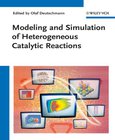Olaf Deutschmann eBooks
Download free Olaf Deutschmann eBooks
Modeling and Simulation of Heterogeneous Catalytic Reactions
From the Molecular Process to the Technical System
The Nobel Prize in Chemistry 2007 awarded to Gerhard Ertl for his groundbreaking studies in surface chemistry highlighted the importance of heterogeneous catalysis not only for modern chemical industry but also for environmental protection. Heterogeneous catalysis is seen as one of the key technologies which could solve the challenges associated with the increasing diversification of raw materials and energy sources. It is the decisive step in most chemical industry processes, a major method of reducing pollutant emissions from mobile sources and is present in fuel cells to produce electricity. The increasing power of computers over the last decades has led to modeling and numerical simulation becoming valuable tools in heterogeneous catalysis. This ...
2007 - 2017 © eBooks-IT.org

